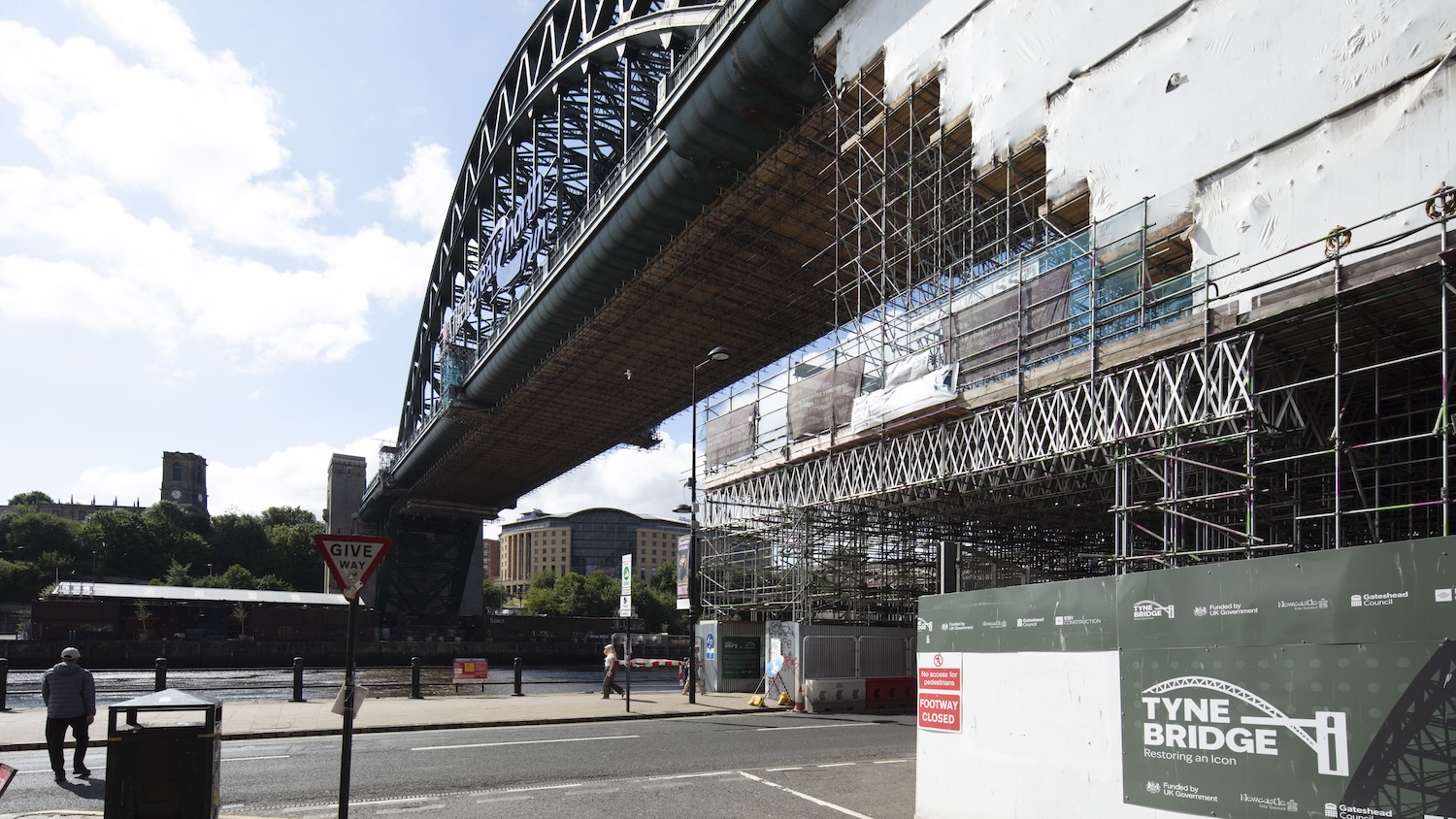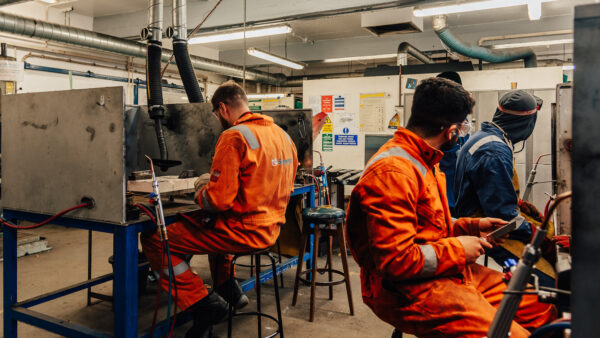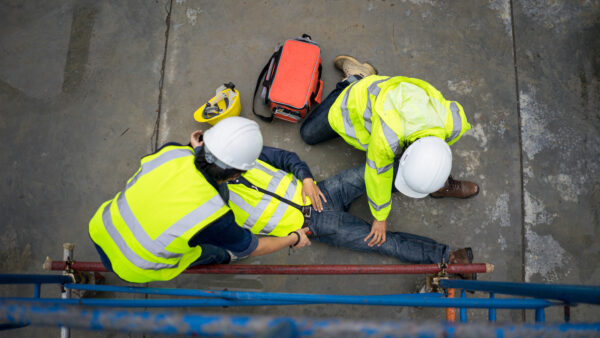
To mark World Suicide Prevention Day, Stephen McClean MCIOB talks to CM People about Esh Construction’s delivery of the Tyne Bridge refurbishment programme and the vital mental health protocols required for the project.
The Tyne Bridge – once the longest span bridge in the world – stands proudly over the River Tyne in the North East of England.
The structure, built almost 100 years ago, is a major arterial link used by approximately 70,000 vehicles every day.
Restoration works commenced on the main bridge deck in April 2024 as part of a major refurbishment project to repair the ageing structure and future-proof the route for future generations.
In 2022, Esh Construction was appointed to deliver the restoration project on behalf of Newcastle and Gateshead councils.
Aside from the technical challenges associated with the £41.4m project, the location of the bridge is particularly complex due to its history of suicide incidents.
Stephen McClean MCIOB, construction manager at Esh, says the bridge is sadly the backdrop for an average of 3.5 reported suicide attempts each week.
“Due to the bridge’s Grade II*-listed status, there are limitations on the measures that can be used to prevent suicide attempts as it would impact the look of the structure, meaning access over the parapets is relatively straightforward,” McClean explains.

We actively raise awareness of the symptoms that someone could be struggling with, and the support that is available
“With the entire bridge becoming our construction site, we need to prevent attempts due to the impact it can have on the site programme and costs, as well as the personal impact on staff and operatives bearing witness to attempts.”
Creating ‘impactful change’
Mental health and suicide prevention remains a thorny issue for the UK construction industry, where 7,000 workers have died by suicide over the past decade, according to data published by The Lost City awareness campaign.
Research from the Chartered Institute of Building (CIOB), published in May, highlighted the state of mental health in the industry.
According to the Understanding Mental Health in the Built Environment report, 28% of respondents working in the industry said they had experienced suicidal thoughts at least once over the past year.
This reality, as well as the location of the Tyne Bridge project, is shaping how Esh is managing and supporting the teams working on the refurbishment programme.
“We believe impactful change comes from providing a safe working environment whereby those who work on our sites and in our offices have access to information and support should they, or someone they know, be struggling with their health or wellbeing,” says McClean.
“We actively raise awareness of the symptoms that someone could be struggling with, and the support that is available, with the aim of removing the stigma surrounding mental health.
“On this project in particular, due to the high number of suicide attempts on the bridge every week, we had to consider the impact these may have on the workforce.
“This prompted us to engage with a number of charities that could provide preventative support with mental health.”
Working with charities
This engagement has included working with Samaritans, James’ Place Crisis Centre and The Lighthouse Construction Industry Charity.
The charities have offered training focused on dealing with suicide attempts, signposting and help for those in crisis, as well as providing staff and subcontractors with access to free help and support.
In addition, Esh has placed awareness posters and leaflets in key areas around sites and in canteens, as well as across the wider business.
The contractor has partnered with Mental Health First Aid England to train a group of mental health first aiders across the business who are equipped and feel comfortable supporting and signposting others to additional support.
The company also provides an Employee Assistance Programme through Health Assured, which offers a 24/7 support line.
Staff can be connected to a counsellor who is equipped to provide advice and additional help and guidance for a variety of issues. The service is free and available to all directly employed staff.
Emergency response
McClean explains that as well as offering support for employees’ mental health and wellbeing, workers at the Tyne Bridge site are provided with additional support in the event that they witness a suicide attempt, or become part of a crisis intervention scenario.
Esh staff and subcontractors are encouraged to follow an emergency protocol, which was created following training with Samaritans.
“We engaged with Samaritans to provide training on ‘how to communicate with a person considering suicide’ for key staff and operatives. [Our] site staff have intervened successfully in a number of suicide attempts,” McClean says.
“We also developed a bespoke Emergency Protocol for Suicide Awareness, recognising that those affected by witnessing a distressing and disturbing event(s) may need additional support and guidance.
“This guidance outlines the steps to be followed when situations arise. It also highlights our ‘2-2-2 step’ to supporting an individual who has witnessed a situation.”
What is Esh’s 2-2-2 step protocol?
Within 2 hours of the incident, a senior staff member (from the site team) contacts the Esh or subcontractor personnel who may have witnessed the incident. This is to check on how the individual is, and to consider whether they need to leave work – they may be asked to return home and speak to family members/friends where possible.
If the individual would rather remain at work, additional monitoring is undertaken and the potential for further discussion offered within a site meeting room or independent location (for example, a café) with a site supervisor and/or HSEQ site representative.
Within a maximum of 2 days (including weekends) of the incident, a follow-up is actioned from a senior staff member (whether the individual is at home or at work) in the form of a conversation to ask how they are, to consider whether they are coping, and to provide support and signposting to relevant services.
Within a maximum of 2 weeks of the incident, Esh provides continued follow-up with the affected individual, including a debrief on site. If a police inquest attendance is required, Esh also supports witnesses to guide them through the likely procedure.
McClean adds that if an individual needs further support, directly employed staff can access eight free counselling sessions with a qualified therapist within seven days of an incident. Subcontractors are directed to the Lighthouse Charity, where they can also access free counselling services, as well as further support.
“The training and site protocol have definitely made staff and operatives more confident in how they feel about the potential of a situation arising,” McClean says.
“They previously would have been worried about: ‘What if what I say is wrong? What if I do something wrong?’ But they now feel they have clear steps and are confident in how to approach.
“They all engage fully in talks from mental health charities that come to site and are keen to chat with them. The team ethic is also stronger, with people looking out for each other.”
McClean acknowledges that “witnessing first-hand the impact that observing a suicide attempt can have on someone, or how it affects those knowing it is a risk when coming to work” has had a profound impact on him and his colleagues.
“Developing the ‘2-2-2 step guidance’ has been paramount to ensuring that people are checked in on regularly,” he says.
“We have regular ‘temperature checks’ with how people feel on the project and we have a dedicated quiet room on site, allowing individuals a safe space to reflect and discuss.
“We have become much more aware of checking in with everyone, socialising where possible to give opportunity for discussion. And we engage in local activities associated with local charities, such as the Newcastle Dragon Boat Race, to get people involved and help reduce the stigma.”
McClean adds that seeing members of the workforce speak out about issues at home, or sharing their gratitude for the support and advice offered on the project, makes him “immensely proud of the team on site and how we look out for each other”.
“I’m proud of the dedication of the staff who have stepped out of their comfort zone to approach an individual considering a suicide attempt, and in doing so following the procedure to engage in conversation, whilst another contacts emergency services who then take over handling the situation.”
McClean is confident the lessons learned from the Tyne Bridge scheme can be carried over to other infrastructure projects across the country. The key is to focus on “more knowledge, training and talking”, he says.
“Providing clear guidelines through protocols has given our site team the confidence to deal with situations that may arise – training from experienced providers and a culture of checking in and looking out for each other is essential.
“On this scheme alone, we have highlighted across the group the need to provide means of assistance and training and will develop the learnings from the Tyne Bridge on our other schemes.”
Mental health support and advice for CIOB members, past members and related family is available through CIOB Assist. CIOB, in partnership with Anxiety UK, also provides wellbeing support.
The Lighthouse Charity offers 24/7 free and confidential support on all aspects of emotional, physical, and financial wellbeing.
24/7 helplines: 0345 605 1956 (UK) 1800 939 122 (ROI)
Text HARDHAT to 85258 (UK) or 50808 (ROI)
Live chat and more information: www.lighthousecharity.org









